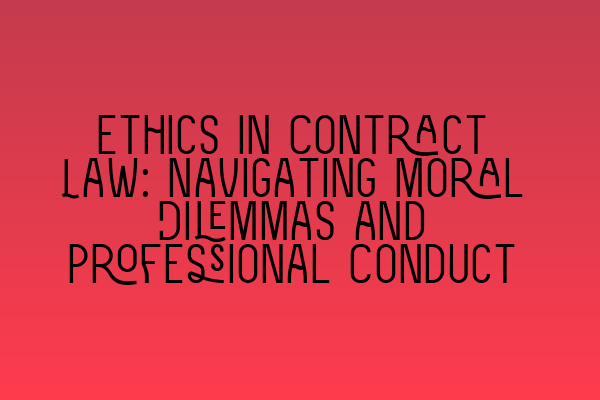Ethics in Contract Law: Navigating Moral Dilemmas and Professional Conduct
Contract law is a fundamental aspect of the legal profession. As solicitors, we are entrusted with the responsibility of ensuring that contracts are fair, enforceable, and abide by the principles of justice. However, in the complex world of contract law, ethical dilemmas can arise, presenting challenges for professionals like us.
In this article, we will explore the importance of ethics in contract law, discuss some common moral dilemmas faced by solicitors, and provide guidance on how to navigate these challenges while upholding professional conduct. Whether you are a law student preparing for the SQE exam or a seasoned solicitor, understanding the ethical dimensions of contract law is crucial for responsible legal practice.
The Role of Ethics in Contract Law
Ethics play a vital role in contract law, as they guide solicitors in upholding the principles of fairness, honesty, and integrity. At the heart of contract law lies the idea of creating a mutually beneficial agreement between parties, based on trust and good faith.
As a solicitor, it is your duty to ensure that the terms of a contract are clear, unambiguous, and do not exploit one party over the other. It is also important to advise your clients on potential risks, possible consequences, and alternative options, fostering informed decision-making.
Integrating ethical practices into contract law not only helps protect the interests of your clients but also contributes to a fair and just legal system. By abiding by ethical standards, solicitors can build trust with clients, colleagues, and the public, enhancing the reputation of the legal profession as a whole.
Common Moral Dilemmas in Contract Law
When practicing contract law, you may encounter various moral dilemmas. Here are some common scenarios and how to navigate them ethically:
1. Conflicts of Interest
Conflicts of interest can arise when representing multiple parties who have opposing interests in a contract. In such cases, it is essential to prioritize the duty owed to each client and avoid any bias or favoritism. Transparency, disclosure, and obtaining informed consent from all parties involved can help mitigate conflicts of interest.
2. Unequal Bargaining Power
Contract negotiations often involve parties with unequal bargaining power. As a solicitor, it is crucial to ensure that the negotiation process is fair and that the weaker party is not exploited. Taking steps to level the playing field, such as providing clear explanations and fostering open communication, can help uphold ethical standards.
3. Misrepresentation and Fraud
Misrepresentation and fraud are serious ethical breaches in contract law. Solicitors have a duty to disclose all material facts accurately and honestly to prevent any misrepresentation. If you become aware of fraudulent behavior by your client or another party, it is your responsibility to address the issue and take appropriate legal action.
4. Confidentiality
Confidentiality is a cornerstone of the solicitor-client relationship. However, ethical dilemmas can arise when balancing confidentiality with the duty to prevent illegal or unethical conduct. Understanding the limits of confidentiality and seeking legal advice when necessary can help navigate these dilemmas.
Guidelines for Navigating Ethical Challenges
While ethical dilemmas can be complex, there are guidelines solicitors can follow to navigate these challenges effectively:
1. Familiarize Yourself with Ethical Rules and Codes of Conduct
Ensure that you are well-versed in the ethical rules and codes of conduct specific to contract law. Familiarize yourself with the Solicitors Regulation Authority (SRA) Code of Conduct and other relevant codes, and stay up to date with any revisions or amendments. This knowledge will provide a strong foundation for ethical decision-making.
2. Seek Advice and Consult Colleagues
When faced with an ethical dilemma in contract law, seek advice from more experienced colleagues or consult legal ethics resources. Discuss the situation and potential solutions, gaining different perspectives that can shed light on the best course of action. Collaboration and collective wisdom can help in making ethical and informed decisions.
3. Reflect on Ethical Dimensions of Contract Law
Regularly reflect on the ethical dimensions of contract law and evaluate your own practices. Consider hypothetical scenarios, analyze the potential ethical issues, and identify ways to address them. This ongoing process of self-reflection will help strengthen your ethical decision-making skills and enable you to navigate moral dilemmas with confidence.
4. Engage in Continuing Professional Development
Engaging in continuing professional development (CPD) is essential for solicitors to stay updated on legal developments and ethical considerations. Participate in relevant training programs, webinars, and workshops that focus on contract law and ethics to enhance your knowledge and skills in this area. CPD also demonstrates your commitment to ethical practice and continuous improvement.
Conclusion
Ethics form the core of responsible legal practice, particularly in contract law, where the stakes are high. Navigating moral dilemmas and upholding professional conduct requires a deep understanding of ethical principles, adherence to relevant codes of conduct, and continuous self-reflection.
By integrating ethical practices into contract law, solicitors not only protect the interests of their clients but also contribute to a fair and just legal system. Striving for ethical excellence in contract law will foster trust, enhance the reputation of the legal profession, and ensure the delivery of justice.
Discover more about contract law and prepare for the SQE exams with the following related articles:
– SQE 1 Practice Exam Questions
– SQE 1 Practice Mocks FLK1 FLK2
Follow these resources to enhance your knowledge and skills in contract law and ensure success in your legal career.
